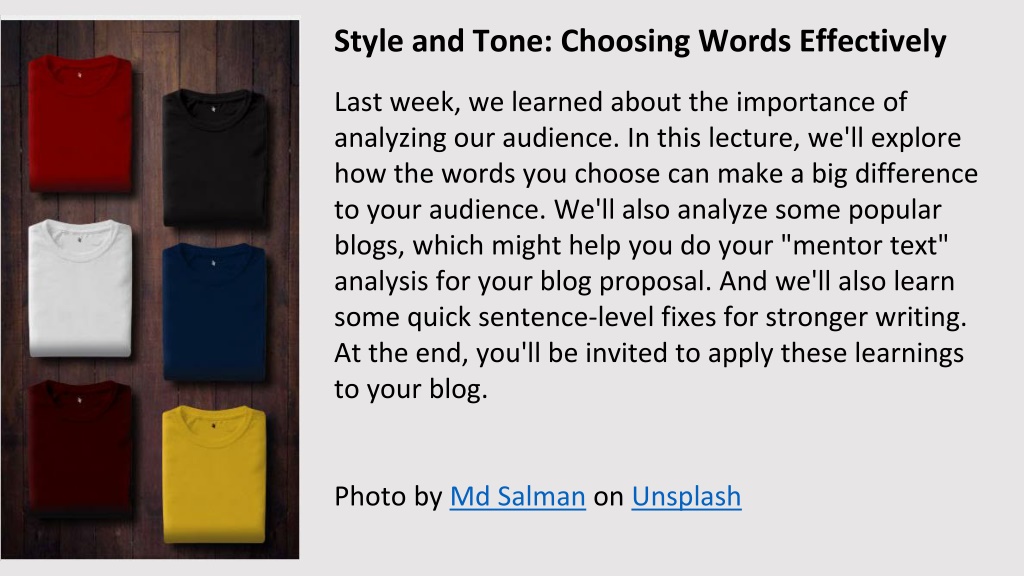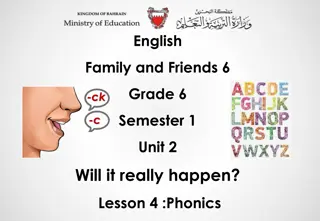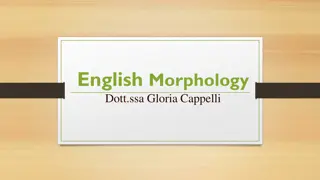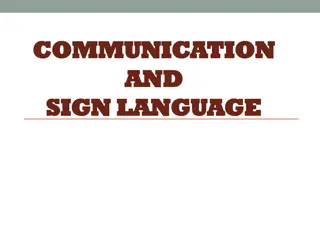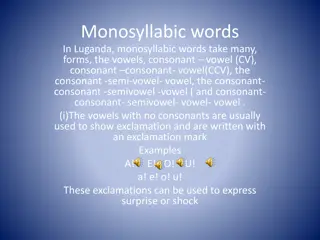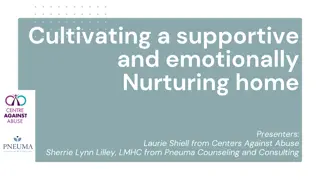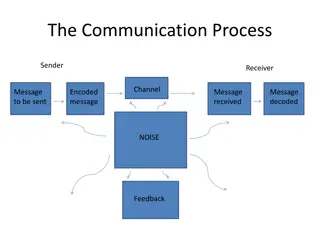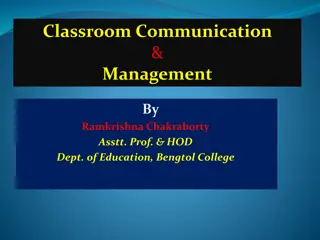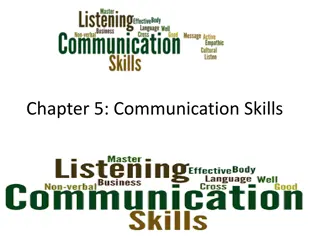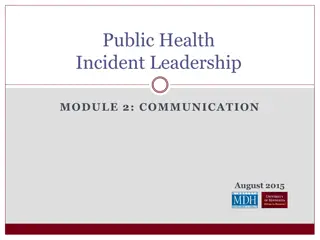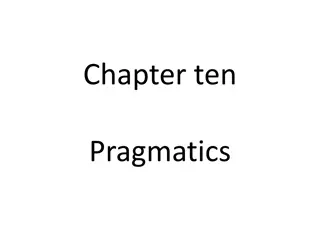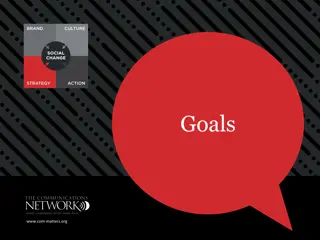Choosing Words for Effective Communication
Discover how selecting the right words can greatly impact your audience's engagement and understanding. Learn from popular blogs, analyze word choices, and enhance your writing skills for successful communication.
Download Presentation

Please find below an Image/Link to download the presentation.
The content on the website is provided AS IS for your information and personal use only. It may not be sold, licensed, or shared on other websites without obtaining consent from the author. Download presentation by click this link. If you encounter any issues during the download, it is possible that the publisher has removed the file from their server.
E N D
Presentation Transcript
Style and Tone: Choosing Words Effectively Last week, we learned about the importance of analyzing our audience. In this lecture, we'll explore how the words you choose can make a big difference to your audience. We'll also analyze some popular blogs, which might help you do your "mentor text" analysis for your blog proposal. And we'll also learn some quick sentence-level fixes for stronger writing. At the end, you'll be invited to apply these learnings to your blog. Photo by Md Salman on Unsplash
Pick a blog Choose a blog to study for the rest of the lecture. Live, Laugh, Mirch: Indian Cooking, Culture and Lifestyle. Tanvii : Fashion, cooking, and lifestyle. LaineyGossip: Celebrity gossip Dan Flying Solo: Travel blog Emmy Made in Japan: Youtube cooking blog. Gizmodo: Technology blog. ReadWrite: Business/technology blog. Fast Company: Business/ lifestyle Inches Per Second: Sound design blog. A List Apart: Marketing blog.
Think of your audience Every decision you make about your word choices will come from your audience's needs. You might consider: How well does your audience understand your topic? If your audience has a lot of expertise, they may expect you to use specialized language, but this may be confusing to non- expert readers. Why is your audience reading your work? Do you want to entertain them, inform them, persuade them, or all 3? A blog that's just meant to entertain might have a chatty or funny voice. A blog that's trying to persuade you to invest in their stock picks would likely use a serious tone. What is your audience expecting? How will your audience use your work? Will they skim it? Read it carefully? How can you make your writing accessible to your audience? Thinking about accessibility for disabled and neurodiverse people makes your writing stronger. Photo by davide ragusa on Unsplash
Activity Look at the blog you've selected. Skim the first post and write down the first 5 words that catch your attention. (These don't have to be the first five words in the post, but just 5 words that you notice). For example, I clicked on the first post of Laineygossip.com and noticed the words: dump, fainter, acrimonious, and nuclear. Now, take a look at the words. What can you tell about the blog based on the word choice? I noticed that the mix of big words like 'acrimonious' and cuss words means that the blog is probably trying to do more analysis than your average gossip magazine, but it's still trying to be entertaining.
Each word choice impacts a piece's tone. This is because words have meaning beyond their dictionary definition, which are called connotations. For example, the word 'thrifty' has a positive connotation, whereas the word 'cheap' has a negative one, even though they mean the same thing. The word 'picky' has a negative connotation, while the word 'selective' has a positive one. In workplace communication, we usually intentionally select words that will leave a positive impression with the reader, unless we're breaking bad news. This is called positive emphasis. When you practice positive emphasis, you focus on seeing things from the reader's perspective and emphasizing the benefits to the reader. Your readings will talk more about this.
Writing Voice Have you ever had the experience of reading a friend's writing and being able to "hear" them? Every one of us has our own writing voice that makes us unique. As your readings explained, your voice includes: The words you choose. The rhythm of your sentences. Do you like long, rambling sentences or short ones? The cadence of your writing. Good writing has a rhythm, just like music. Try reading a sentence or two from a favourite book out loud. You'll probably feel that it "flows" well. Unique expressions or mannerisms. Sometimes, people who are new to business communication try to put on a "business voice," but it often gets wordy/vague. It's best to stay true to your own writing voice, but edit it so that it fits a new context. Photo by Gene Jeter on Unsplash
Activity Read the first few paragraphs of the blog, paying attention to the writer's "voice." How would you describe the voice? How does the writer achieve this voice? For example, I noticed in the Laineygossip blog that the writing is kind of snarky but also has lots of analysis. It feels like you're listening to someone who's really smart gossip with you. I think the writer achieves this voice by using sentence fragments, to make it sound more like real speech, and by being very intentional with word choice.
Weak Writing Habits that Hold Your Voice Back Now, let's take a look at some writing issues that can hold back your voice. For this part of the lecture, you can stick with analyzing your chosen blog, or you can examine some of your own writing. The weak writing habits we'll explore are: Wordiness Filler phrases Run-on sentences or sentence fragments Repeating sentence patterns Jargon / clich s Vague language Passive voice
Wordiness If you're used to writing to word counts, you might have picked up a wordiness habit. Sometimes, we need long sentences to convey meaning, but wordiness happens when several words are doing the same job without adding any new information. For example: I would like to inform you that due to an unforeseen and surprising incident involving delayed pickup that occurred the shipment that you ordered will be unfortunately waylaid and not available for pick up. What is this author trying to say? Basically, "Your order will be late" or "Your order will be late because of postal delays." Here, the bolded words are unnecessary. They don't give the reader any new information. The italicized text use 12 words to convey 'because of postal delays.' They're also unnecessarily vague. The plain text use 15 words to say "Your order will be late." Note also that the most important information, which is in regular font, is at the back of the sentence. Moving important information to the beginning of the sentence nearly always improves the sentence. When you revise, look for multiple words doing the work that just one word could do. Or, look for sentences where important information is at the back of the sentence.
Filler phrases Before you hand in your document, do a search for filler words like: "There is" and "There are" and "There was." These are the written version of "um" and are a sign your sentence needs revising. You can usually remove them. Funneling phrases: Sometimes when you're trying to figure out what you want to say, you write your way into the sentence by saying something like "I think that.." or "According to me..." You can remove these. Basically/ absolutely/ always (if something's obvious, you don't have to state it) Very (Occasionally, you'll need adjectives for emphasis, but often they're unnecessary or it's a sign your words could be replaced with something more specific. For example, instead of saying "I am very happy to inform you" you could say "I'm thrilled that...")
Run-On Sentences Or Sentence Fragments An independent clause has a subject, a verb and is a complete thought. For example, in "Arley kicks the ball," Arley is the subject. Kicks is what the subject's doing. The ball is the object. It's a complete thought. A run-on sentence is when two independent clauses are smashed together without a period or semi-colon in between. Example: Arley kicked the ball she likes soccer. To fix it, correct the punctuation or make one cause dependent. Example: Arley kicked the ball. She likes soccer. or Arley kicked the ball because she likes soccer. A sentence fragment is when a clause that's lacking a subject, a verb or isn't a complete thought is treated as if it's independent. Example: Because she liked soccer. (This has a subject and a verb, but isn't a complete thought, since it needs more information to make the 'because' make sense.) To fix it, attach it to an independent clause or make it independent. Example: Arley kicked the ball because she likes soccer.
Repeating Sentence Patterns Everyone has a favourite sentence pattern, but repeating it too much leads to clunky prose. For example: Arley kicks the ball. She likes soccer. Soccer is fun. Soccer is good exercise. We all play soccer. If you've noticed that you've used the same pattern over and over, consider revising the paragraph to vary the sentence patterns. For example: Arley kicks the ball because she likes soccer. Since 2011, she's been practicing her soccer skills. Now, it's time to get in the game. This is called modulation.
Jargon/ Cliches Your optional reading taught us that workplaces are full of jargon or "garbage language." Unless you've been told to use particular terminology, your writing will be easier to understand without jargon. Plain language is especially important if you're communicating interculturally, since a lot of jargon doesn't make sense to people from other cultures. One way to tell whether a phrase is a cliche or jargon is to ask whether you're using it to make your writing easy for more people to understand. Often, jargon is used to conceal and make ideas seem more complex than they are. Using concrete, specific phrases will help your ideas shine through.
Vague Language To make your writing clearer and easier to understand, focus on the verbs. If you find a verb that you can't visualize, replace it with something more concrete and specific. For example, which sentence provides you with more detail? She went to the store. or She walked to the store. We participated in the fun run. or We panted and puffed our way through 5K for the fun run.
Passive Voice In active voice, the subject of the sentence is the one who performs the action. In passive voice, the object is the focus. For example: Active: Arley kicked the ball. Passive: The ball was kicked by Arley. Occasionally, we'll need passive voice sentences because we want to focus on the object. Usually, however, passive voice leads to weaker verbs, wordiness and more grammar mistakes. Passive voice is also slippery, because companies use it to avoid taking responsibility. In phrases like "Mistakes were made" or "The computer was broken," there's no human present: no one to make the mistake or break the computer.
Passive Voice is Political As you can see from these headlines and tweets, passive voice is often a political choice. In some headlines, the person who did the action is emphasized. In other, the person who did the action is hidden. For example, in this tweet, the protestor actions are in active voice, and the police actions are in passive voice.
Can you identify other uses of passive voice in these headlines and tweets?
Activity Using either the blog that you're studying or a piece of your own work, see if you can find some of the principles we just discussed, such as: Wordiness Filler phrases Vague language Passive voice Activity Using either the blog that you're studying or a piece of your own work, see if you can find some of the principles we just discussed, such as: Wordiness Filler phrases Vague language Passive voice Sentence fragments or run-on sentences Jargon Sentence fragments or run-on sentences Jargon
Reflect On What You Learned In this lesson, we focused on writing at a sentence level. Take a moment to reflect on the "voice" of your blog. Come up with 5 things you'd like to do to meet your audience's needs at a sentence level. For example, I chose: Use clear, specific language Revise my work to avoid "there is/there are" Mix in shorter sentences with longer ones Read my writing out loud to hear how it sounds Read my other blog posts before I start to maintain a consistent voice
